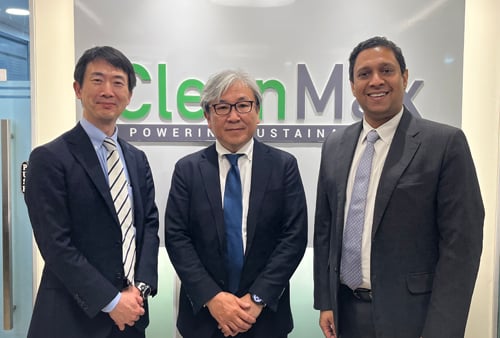
Japanese gas company Osaka Gas has partnered with renewable energy developer Clean Max Enviro Energy Solutions to form a joint venture to develop a 400MW renewable energy portfolio in India.
According to a statement released by the companies, the joint venture will be formed by a consortium led by Osaka Gas Singapore, a wholly owned subsidiary of Osaka Gas, and Japan Bank for International Cooperation (JBIC).
Unlock unlimited access for 12 whole months of distinctive global analysis
Photovoltaics International is now included.
- Regular insight and analysis of the industry’s biggest developments
- In-depth interviews with the industry’s leading figures
- Unlimited digital access to the PV Tech Power journal catalogue
- Unlimited digital access to the Photovoltaics International journal catalogue
- Access to more than 1,000 technical papers
- Discounts on Solar Media’s portfolio of events, in-person and virtual
This joint venture, Clean Max Osaka Gas Renewable Energy, will target a portfolio of 400MW renewable energy assets in the next three years.
The Japan Bank for International Cooperation (JBIC), a public financial institution and export credit agency promoting cooperation between Japanese companies and overseas partners, will support the joint venture after signing a shareholders’ agreement earlier this month to invest with Osaka Gas in the renewable energy portfolio in India.
Specifically, JBIC will make an equity investment in these projects, which Clean Max will develop and operate. These are being explored mainly in Karnataka, a state in the southwest of the country.
JBIC’s equity investment is intended to support Osaka Gas’s overseas expansion, thereby contributing to maintaining and improving the international competitiveness of Japanese industry.
The core of this renewable energy portfolio will be generation assets such as solar PV and wind. However, the company noted that it would explore opportunities to expand its remit to cover new energies such as green hydrogen and e-methane.
The joint venture will also tap into the power purchase agreement (PPA) market by inking direct corporate PPAs with commercial and industrial customers.
India installs 25.2GW of solar PV capacity in 2024
India’s renewable energy market continues to grow, with the country installing a record 25.2GW of solar PV capacity in 2024, according to a report from Mercom India Research.
The research firm said this represents a 204% increase from the 8.3GW of solar PV additions registered in 2023. Solar PV accounted for the majority (73%) of India’s new power capacity added in 2024.
Mercom’s solar PV installations for 2024 are roughly on par with data from energy consultancy JMK Research, which registered 24.5GW of Indian PV additions last year.
Utility-scale solar accounted for the bulk of PV additions in 2024 with 22GW, up 235% from the 6.6GW installed in 2023.
Solar-wind hybrid and energy storage on the rise
In 2024, India’s renewable energy tenders increased by 25% year-on-year, with hybrid solar-wind and energy storage systems (ESS) making up nearly half of the 73GW of total capacity tendered across the year.
Last year also marked the second year that India tendered more than 50GW of its annual renewable energy target set by the government to install 500GW of non-fossil fuel generation by 2030.
The annual government target of 50GW was set in 2023 for a five-year duration and followed a three-year period (2020-2022) during which the country tendered less than 30GW of renewable energy utility-scale capacity. This target is distributed among four REIAs: SECI, NTPC, SJVN, and NHPC.
State-owned firm Solar Energy Corporation of India (SECI) has been the largest utility-scale renewable energy tendering agency, with more than 113GW of tendered capacity, nearly 60GW of which came from solar PV, as of December 2024. This is treble the amount issued by NTPC, the second-largest issuer of tenders.







